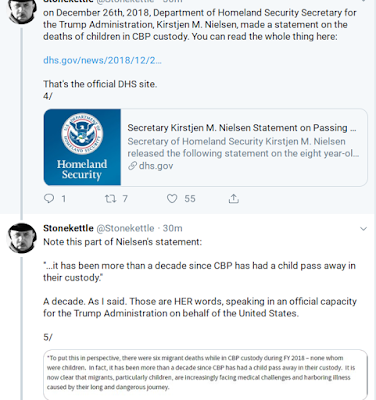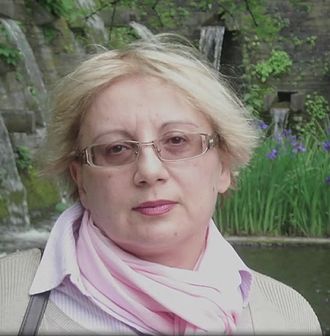We speak in respectful tones about that primordial soup from which profits flow, the marketplace. Great numbers of people worship at that altar...probably more than worship in old-fashioned religious venues. When the numbers are good, the news announcer reading the results often has happy background music playing, something like "We're In the Money." If the numbers are down, the music might be "Stormy Weather." It's as much a part of our culture as sports and popular foods to rejoice when the "Market" is good, and gloomy if the report is "down." At some level everyone, even those who will never see a stock certificate, some of whom will never guess that there is a cap on social security taxes every year for people earning over a certain amount...everyone feels connected.
It's not fashionable to ask where
profits come from, however. It's like asking if someone has had cosmetic surgery or was fortunate enough to come into a lot of money following the recent death of a loved one. We want the dealership from which we get our car to be profitable enough to keep up with the warranty service, but we don't want any profit to that dealer from our purchase, and we sure as hell don't want to pay dealer prices for service. Profit is what happens when a company makes a good deal with someone else. When I have to make the same deal, however, they are taking advantage of me.
Not everyone thinks like this, of course. There are lots of people who cheerfully pay a dear price to be the first or latest in their peer group to see a movie or own a certain fashion or travel to some wonderful destination. Big tips, ostentatiously bigger than the norm, are sometimes found by delighted service people who don't care that they say more about the ego needs of patrons than the quality of their service. And a few people take a balanced view of profits and don't get disturbed about their contributions to someone else's profit.
In the face of all this resistance on the part of customers, clients and patrons to cut them out of reasonable profits businesses are forced to be imaginative about being able to report ever higher profits. The word "bubble" comes to mind first, because that is the easiest track to profits in the short term. We have seen it many times, from the famous tulip bulbs to the California Gold Rush to the explosion of dotcoms. In the end the bubble bursts (hence the term) but there are what I would call "serial bubbles" (see "serial monogamy") in real estate, fashions, entertainment and advertising. I heard a couple of weeks ago that insurance stock prices go up when a hurricane hits because historically that is when premiums go up, not only to cover "losses" due to weather, but improved profits as well. Why do insurance companies jack up the prices at just the time that their policy holders can least afford to pay more? Because they can.
A few years ago, and to some extent continuing today, the phenomenon of "mergers and acquisitions" yielded breathtaking "profits". When two companies in the same line of work merge it is a win-win situation (except for the people whose jobs are sacrificed for the deal) because the new, stronger company has one less competitor in the marketplace (whew!) as well as a more efficient operation, because the payroll departments, accountants, ad agencies and other support operations can be performed by one department instead of two. All this improved efficiency translates into profits.
Speaking of accounting, now there is the toolbox from which a lot of profits can be made to flow. When they get the cooperation they need from operations there is practically no end to the profits that can result. Just ask the people at Enron how easy it can be.
Have you noticed that so far that nothing has been mentioned about
productivity? That is my point. The only real source of profits haas to be that something has been produced. Moving the furniture around does not produce anything, unless you are paid to be an interior decorator. Mergers might squeeze a few cents from the economy of scale, but they real improvements, if you can call them that, is that there is more to report for profits because fewer people are being paid.
This brings us to the notion of outsourcing, the ultimate job eraser. Outsourcing has had it's bony finger in nearly every business enterprise in the marketplace. I would like to advance the notion that corporate reliance on outsourcing is tantamount to an admission of failure. It is easiest to see in something like janitorial work, the bottom of the economic ladder by most standards. Very few organizations today directly employ the people who literally clean up behind them. The reasons are easy to grasp. Nobody wants to take out the trash, clean the restrooms and refill the soap dispensers, so it is easier to pay an outside company to do that job than go to the trouble to hire and train someone and hold them accountable. And don't even mention the benefits that they would expect. After a few years they could be wanting a vacation like everyone else. Next thing you know, they might even want to be getting ahead in life and someone would have to be trained to replace them. Imagine that.
I'm trying not to sound cynical, but I'm not trying very hard. I have watched for years as the idea of people skills and management accountability have become less and less a part of business life. Few supervisors are trained to spell out their expectations in language that is clear but not judgemental. Even fewer are trained to be the patient coaches they have to be if they are to develop their subordinates into more than robots. For the past few days I have been thinking that outsourcing is the contemporary successor to mergers as a generator of false profits, because in most cases the end result neither improves the service nor generates any new value to the owner/stockholder.
And the social consequences of jobs being lost....don't get me started.
~~~~~
This post was about ten days ago. And already I run across a link about the "internet bubble" and its consequences.
http://www.paulgraham.com/bubble.html
The writer begins by arguing that by going public before earnings are possible a new company is really just raising venture capical (VC) from the market rather than from the customary private sources. In time, he says, the marketplace may do better at assessing new business ventures than the private sector.
>>After the excesses of the Bubble, it's now considered dubious to take companies public before they have earnings. But there is nothing intrinsically wrong with that idea. Taking a company public at an early stage is simply retail VC: instead of going to venture capital firms for the last round of funding, you go to the public markets.
- By the end of the Bubble, companies going public with no earnings were being derided as "concept stocks," as if it were inherently stupid to invest in them. But investing in concepts isn't stupid; it's what VCs do, and the best of them are far from stupid.
- The stock of a company that doesn't yet have earnings is worth something. It may take a while for the market to learn how to value such companies, just as it had to learn to value common stocks in the early 20th century. But markets are good at solving that kind of problem. I wouldn't be surprised if the market ultimately did a better job than VCs do now.
- Going public early will not be the right plan for every company. And it can of course be disruptive-- by distracting the management, or by making the early employees suddenly rich. But just as the market will learn how to value startups, startups will learn how to minimize the damage of going public.
The link is worth following. I cannot post a forward link from the comments, but I will post a backward link to my original post when blogging today.
The most important of all social contributions is providing jobs. The rest is virtually cosmetic. I think an argument can be advanced that the more jobs there are, the greater the social contribution, with recycling, charitable contributions, green space, reduction of toxins and all the rest of what companies like to brag about falling somewhere down the list. Without jobs, all the rest is cotton candy.
Having stripped Corporate Social Responsibility and Perks down to the bones, jobs and wages, take a look at what is really at stake. Economists like to speak of The Marketplace, but they normally are referring to that wonderful macro-universe that captures the attention of analysts, professors and Alan Greenspan. Boy, when you get out there in space you can swim about in an ocean of economic theory and argue til the cows come home about interest rates, trends, world climate and an endless list of fun topics. But I can tell you that when you are at the grassroots of the economy you see things a lot differently.
By "grassroots" I'm not referring to unit managers or field-reps, which is what mostly comes to mind when the word is mentioned. The term "grass roots" calls up messy problems like "turnover" or "liability claims" or "wage pressures" or some of the other boring, nitty-gritty details of operations. But everyone knows that those are like the wheels of a car, the paint on the house, cutting the lawn...that's just everyday stuff that has nothing to do with the real issues of economics. Right?
Wrong. Those are the foundational issues driving the entire economy. From the time that Henry Ford build a car he understood that
if no one could buy the thing, all the assembly lines and efficiencies in the world would be of little use. Here's where corporate responsibility and "perks" connect, where the rubber meets the road.
One of my hobby horses has to do with
outsourcing, which is another way to say
"We don't want to go to the trouble to teach anybody to do something, so we will go elsewhere to get it done." I have watched this trend up close and personal for my whole career. Outsourcing in the food business means getting a factory to furnish what used to be done by ordinary people. When I first started in the cafeteria business every unit was its own little factory. We did everything from scratch. Hanging meat was butchered into everything from steaks to ground meat, and everything in between. We rendered the suet to grease the griddle, boiled the bones to make the best-tasting beef stock, and when we were done, sold what could not be used to a company recycling tallow. Pie shells were hand-made, as were rolls, biscuits and cornbread. Even loaf bread used to make garlic bread was made from scratch at each location. We never used it, but there was a recipe in the file to make jelly from the apple peels that were a byproduct of apple pie.
Everything that I have described was accomplished, not by culinary experts, certified by the CIA (Culinary Institute of America, not the other one) but ordinary people who usually started by washing dishes, clearing dirty tables in the dining room, or serving food on the line. The term "entry level job" had a serious meaning in that context. It meant that if you were not willing to do dirty work, then someone else got the job and you were back in the street. If you wanted to do better after landing that "entry level job," then you could wait for the next available job in the bakery, kitchen or salad department where you would be taught to do something better by a head baker or chef or lead salad maker who got their respective jobs by climbing a ladder, just like you were about to do.
So what about the perks? What about corporate social responsibility?
Corporate responsibility was expressed in the ongoing creation of jobs, a corporate function that clever people in high places saw as "the cost of labor," an expense that needed to be controlled. You can see where this is going. I worked in a situation where the first item on any list of "corporate responsibilities" was being systematically abandoned. In the same way the the doctor's oath says "First, do no harm" the beginning of all corporate responsibility is (or should be) "First, don't cut off the lifeblood of your employees."
Well, control they did, those clever people in high places, by outsourcing -- until the essential staff that once numbered by the score was reduced to a skeletal remnant of functionaries (it's not right to call them cooks any more) whose principal talent is expressed in opening frozen, canned or boxed products and artfully putting them into a display. (And don't get me started on what has happened to the flavor profiles...)
And the perks? I can tell you about the perks.
Perquisites are what the company can furnish beyond wages that do not, cannot, will not cost anything to provide. That's why they are called perquisites. When the definition says incidental to regular salary or wages it truly means incidental. You can be sure that anything that adds up as an expense will be monitored, measured and controlled by those same clever people who eliminate jobs by controlling labor costs. In the end, it is up to the resourceful boss to come up with perks for his people.
And despite the cynical tenor of what I am writing, I can assure you that there are real, important, well-understood, deeply appreciated perquisites in the tool box of any good boss. All he has to do is take them out and use them. They include treating everyone with dignity and consistency, bending over backward to be fair to all, and holding experienced people more accountable than new people. (What? Did I say giving newcomers a break that you don't give old-timers? You bet. And you get away with it by reminding every one of the old-timers that they were once new, and had no one given them a break, they would not be where they are today.)
Other perks might be awarding desirable schedules to deserving people, rewarding those who do well by not pinching off those little bits of overtime earned by doing extra work, or simply making a deliberate effort to speak to everyone, every day, in a tone of voice that really connects and says "I appreciate you and your good work. It is a privilege and a pleasure to be working with you." That's not easy to do when the person must be assigned to a job that can't be seen by the public because either the job or the individual might spoil even the biggest appetite.
After reading what I have written I have to admit that what I have done is basically a rant. I really mean no disrespect for those "clever people in high places," because many of them got to where they are by climbing the same ladder that I have described. The difference is that they just kept climbing. Nevertheless, it has done me good to get it out of my system.
However, I do wish that with the growth of large corporations more thought could be given to people, the real base of all success. It is true that profits and the marketplace drive everything else.
It is not the company that sets wages, it is the marketplace. Prices, like wages, are also set, not by companies, but by the laws of supply and demand. There is one and only one social responsibility of business - to use its resources and engage in activities designed to increase its profits so long as it stays within the rules of the game, which is to say, engages in open and free competition, without deception and fraud. Stated more simply years ago: the worst thing that any company can do - to its employees, its owners or its customers - is to go out of business.
It is that inarguable law of survival that drives all of economics. That law, as unforgiving as the law of gravity, is what causes so many to worship at the altar of profits. Maybe it is for that reason we have allowed corporations to enjoy the same legal status as people. It's too bad that people must cope with survival, and in the end, their inevitable mortality despite all they might do to delay it, without the same safety nets afforded their corporate competitors.














 Tabarashi
Tabarashi









